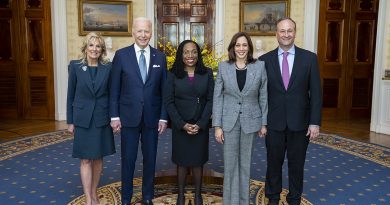Rocket to Nowhere: U.S. and North Korea’s Strained Relations
Gabrielle Goldworm
Staff Writer
In April of 2017, news outlets such as The Atlantic and The Washington Post characterized the Trump administration’s foreign policy on North Korea as only partially defined at best. Back in March, Secretary of State Rex Tillerson made this statement after meeting with South Korea’s foreign minister: “Let me be very clear: the policy of strategic patience has ended. We are exploring a new range of diplomatic, security, and economic measures.” Tillerson stated “all options are on the table” when it comes to engaging North Korea. “North Korea must understand that the only
path to a secure, economically-prosperous future is to abandon its development of nuclear weapons, ballistic missiles, and other weapons of mass destruction,” he said. According to a report by the New York Times, Tillerson also rejected negotiation with North Korea saying, “Conditions must change before there is any scope for talks to resume.”
However, the conflict continues to echo its cold war predecessor, in terms of lack of overt military action so far. Tillerson and other officials within the Trump administration have repeatedly softened their boss’s hardline stances in conferences following his speeches.On September 21, President Trump announced an executive order granting authority to the Treasury Department to enforce economic sanctions on North Korea and companies and individuals with whom they do business.
Amid incidents of name-calling and threats of nuclear annihilation from both sides, the act seems closer to Obama Era policies than an implementation of Trump’s so called ‘fire and fury’ approach. The North Korean government have, according to CNN, found it difficult understand the mixed signals being put out by the Trump administration, and have even reached out to Republican analysts in an effort to navigate the President’s comments at times of contradictory rhetoric. After North Korea’s sixth nuclear test in early September, multiple speeches by both Trump and Kim Jong Un decrying the other’s madness, and displays of military power, anxiety is to be expected. One such instance occurred recently when a U.S. bomber flew close to North Korea’s coast.
It is fair to note that U.S./North Korean Relations currently remain an unattractive zero-sum game for both parties. The international community remains on edge, though most agree the chance of direct military confrontation remains slim.
Strange as it might seem, the United States and North Korea have been in this position before, even to the point where North Korea accused the U.S. of declaring war. Despite inflammatory remarks hurled by both side, the United States is the only side making any headway through soft power tactics, reports the Wall Street Journal. Through diplomatic channels, the U.S. has convinced over 20 nations to halt all diplomatic and business relationships with Pyongyang.
According to the Wall Street Journal, the 20 countries have shut down businesses owned by the North Korean Government, removed North Korean vessels from ship registries, and expelled its ambassadors.
For now, the world continues to see words, not deeds, as both sides consider how much direct conflict would cause them to lose.

